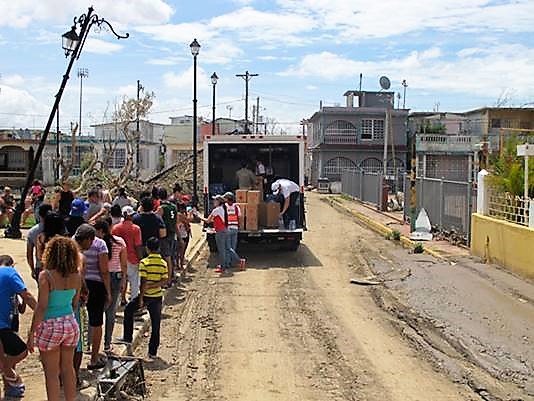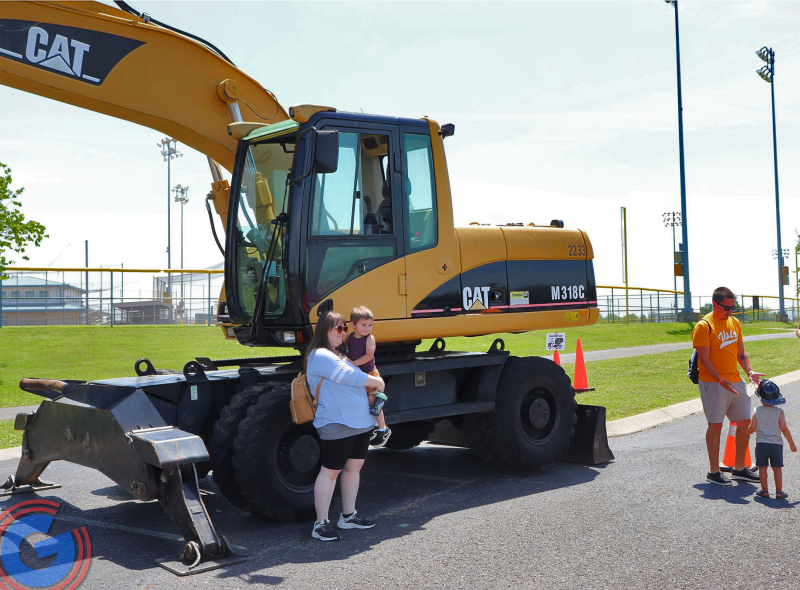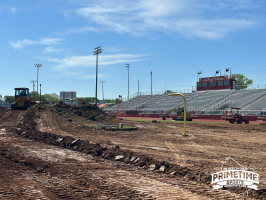Here is an update from the American Red Cross on Hurricanes Maria, Irma and Harvey, and Mexico Earthquake
In the last five weeks, the American Red Cross has launched a wide-ranging relief effort to help people devastated by three historic, back-to-back hurricanes - Harvey, Irma, and Maria. The Red Cross is on the ground, part of a large team of agencies and organizations responding to provide help to communities devastated by these three Category 4 storms. The Red Cross also continues to support relief efforts following the earthquakes in Mexico.
HURRICANES MARIA AND IRMA
Hurricane Maria Domestic Red Cross Response
It has been more than a week since Hurricane Maria devastated Puerto Rico and the U.S. Virgin Islands, and the American Red Cross is working around the clock with government officials and disaster partners to help the hundreds of thousands of people on both island territories who are suffering right now.
Thousands of homes are destroyed or suffered major damage. People are living without power and water. Cell service is out, making it difficult for to connect with loved ones. Only one hospital is fully operational, with dozens more partially so. The storm also destroyed bridges and roads, making it difficult to get help to some areas. It could be months until power is restored with 80 percent of overhead transmission lines damaged. Fuel is available, but conditions make it almost impossible to distribute it.
Even as river flooding continues in many areas, more heavy rain is forecast over the weekend, which could lead to additional flash floods and mudslides. Officials estimate that emergency shelters and food support will be needed by a large portion of the population in both territories for weeks.
The Red Cross has mobilized relief supplies to support our response efforts on the islands. This includes: 20,000 comfort kits; 6,000 blankets; 5,000 cleanup kits; 8,000 tarps; and thousands of flashlights, batteries, dust masks, and hand sanitizer. In addition, the Red Cross has sent in generators, laptops, satellite phones and radios to help our volunteers communicate and coordinate response efforts.
The Red Cross is working very closely with the entire response community - government agencies, other non-profit groups, faith-based organizations, area businesses and others - to get help to people as quickly as possible.
- For example, teams of ham radio operators from the American Radio Relay League and The Salvation Army Team Emergency Radio Network have deployed to help with communications and reunification.
- International Red Cross volunteers from Mexico, Spain, Finland, Costa Rica, Honduras and Colombia are distributing food and water and helping with damage assessment.
- Dozens of additional disaster partners are helping to support feeding, child care, disaster assessment and other disaster services. Some of these partners include The Peace Corps, Adventist Development and Relief Agency, All Hands Volunteers, The Salvation Army, Save the Children, Southern Baptist Disaster Relief, Team Rubicon, UnidosUS and VOAD Puerto Rico.
Puerto Rico
- On Puerto Rico, nearly 400 Red Cross workers are helping to reconnect families and distribute critical relief supplies, including food and water.
- International Red Cross workers are restoring connectivity for people impacted by the hurricane and for humanitarian workers on the ground, installing satellites that are enabling Puerto Ricans to reconnect with family members, charge their phones and access information. The satellites and technology also help aid workers as they coordinate relief efforts.
- In coordination with government and non-profit partners, the Red Cross is helping to distribute water, ready-to-eat meals, fresh fruit and vegetables, tarps and comfort kits. Emergency distribution of water has been provided to several vulnerable communities which were running out of water. The Red Cross has already mobilized more than 250 tractor-trailer loads of relief supplies to help Puerto Rico. Red Cross teams are also assessing what communities need, and providing health and mental health services.
- More than 11,400 people stayed overnight in 163 government evacuation shelters. On Puerto Rico, shelters are managed by the government, but the Red Cross is preparing to support sheltering efforts in case our assistance is needed.
- The Red Cross supplies our hospital partners in Puerto Rico with blood products collected in the continental U.S. With local blood collections on the island significantly impacted by Hurricane Maria, the Red Cross has provided more than 1,000 blood and platelet products to help hospitals the Red Cross does not typically supply. These supplies are in addition to ongoing blood product distributions to Red Cross hospital partners in Puerto Rico. While transportation logistics remain tremendously challenging both on and off the island following the devastating storm, the Red Cross continues to deliver blood and platelet shipments to Puerto Rico.
U.S. Virgin Islands
- On the U.S. Virgin Islands, the Red Cross is supporting shelters, serving meals and snacks, and distributing relief supplies.
- More than 200 Red Crossers are working around the clock to support people who are living in very difficult conditions. Some people are arriving at the shelters with medical needs and the Red Cross is helping them.
- On Thursday night, nearly 390 people stayed overnight in 7 evacuation shelters.
- After back-to-back hurricanes, the Red Cross has:
o handed out more than 10,000 relief items;
o served more than 36,000 meals and snacks;
o provided more than 1,000 mental health and health services to people in need.
Hurricane Irma Domestic Red Cross Response
Three weeks after Hurricane Irma crashed into Florida leaving behind widespread devastation, the American Red Cross and a large team of partners continue to work around the clock to provide shelter, food and comfort to people whose lives have been turned upside down. In Florida, hundreds of people remain in emergency shelters, and the Red Cross is there, making sure people get the help they need as they plan their next steps.
In Florida, officials estimate that more than 195,000 homes were either destroyed or received major damage. In the Florida Keys, officials estimate that 25 percent of the homes were destroyed and 90 percent damaged. And Red Cross workers are providing food, shelter, relief supplies, health services and emotional support in the hardest hit areas. Red Cross vehicles are continuing to deliver meals and relief supplies to people cleaning up their homes.
The Danish Red Cross erected a base camp in Big Pine Key, Florida to house Red Cross disaster responders. Housing resources and hotel rooms are in very limited supply on the Keys. This allows the Red Cross to free up valuable lodging spaces for returning residents. In addition, schools that were being used as staff shelters can now get back to normal business.
U.S. Mainland
- Overnight, almost 600 people stayed in 7 emergency shelters in Florida.
- Along with our partners, we have served more than 1.4 million meals and snacks across six states. We've distributed more than 647,000 relief items like diapers, bug spray, cleaning supplies, coolers, and comfort kits containing deodorant, toothbrushes, toothpaste and other hygiene items across six states.
- Red Cross volunteers have provided more than 37,000 mental health and health services to support and care for those affected across six states.
- More than 1,300 Red Cross workers are responding to Irma now, with more than 100 additional volunteers on the way. And, 127 emergency response vehicles are helping to deliver meals and relief supplies across the hardest-hit areas in Florida.
Combined International Red Cross Response
Island countries in the Caribbean are facing catastrophic damage from the one-two punch of Hurricanes Maria and Irma just days apart and Red Cross Societies from around the world are moving disaster workers and supplies into the region to help. Maria's landfall on already devastated islands is making it difficult to deploy supplies and people. The Red Cross is working as quickly as possible to get help where it is needed.
- More than 10 countries and territories suffered the impact of Hurricane Irma.
- The International Federation of Red Cross Red Crescent Societies (IFRC) reports damages in Antigua and Barbuda, British, Dutch and French Antilles, the Bahamas, Cuba, the Dominican Republic, Haiti, Saint Kitts and Nevis. Hurricane Maria affected Dominica and Puerto Rico.
- Damages include flooded homes, lack of drinking water and electrical services, massive destruction of plantations and crops, risks associated with mosquito-borne and water-borne diseases, collapsed structures, public safety issues, and millions of evacuees in shelters.
- The IFRC is coordinating with national societies in each country and territory to support affected communities, including distribution of humanitarian aid, deployment of specialized staff focused on water and sanitation, health, shelter and other activities.
Major relief efforts continue throughout the Caribbean. The American Red Cross has committed $450,000 to assist in meeting the immediate needs of those affected, including $150,000 for Dominica, $200,000 for Cuba and $100,000 for St. Kitts and Nevis and Antigua and Barbuda. On Dominica, a global Red Cross emergency team, including four American Red Cross disaster response specialists, is on its way to Dominica to support damage assessments and relief operations.
HURRICANE HARVEY
Five weeks after Hurricane Harvey caused the largest flooding event in U.S. history, the American Red Cross continues to provide shelter, food, relief supplies and other support to help people whose lives were turned upside down.
Emergency shelters are still open to support hundreds of people who have no place else to go. Red Cross response vehicles and volunteers are distributing nutritious meals and relief supplies such as diapers, bug spray, cleaning supplies, coolers, and comfort kits that contain deodorant, toothbrushes, toothpaste and other items.
Red Cross caseworkers are connecting one-on-one with people still in shelters on their next steps and possible housing options. Red Cross disaster workers are also providing health services such as replacing lost medications and eyeglasses, emotional support and spiritual care to people affected by this devastating storm. Tens of thousands of services to support and care for people in Texas and Louisiana have already been provided.
As of September 28, the Red Cross has authorized more than $148 million in financial assistance to help more than 370,000 Texas households severely affected by Hurricane Harvey, and continues to process applications.
Furthermore, more than 2,500 Red Cross disaster workers are on the ground in Texas, with more than 170 on the way, supporting these efforts:
- Overnight, more than 1,300 people stayed in 12 Red Cross and partner shelters across Texas.
- Along with our partners, we have served more than 3.4 million meals and snacks in Texas and Louisiana.
- As many as 157 emergency response vehicles are helping to deliver meals and relief supplies across the hardest-hit areas of Texas.
- Red Cross volunteers have provided more than 106,000 mental health and health services to support and care for people in Texas and Louisiana.
- We've distributed more than 1.1 million relief items like diapers, bug spray, cleaning supplies, coolers, and comfort kits containing deodorant, toothbrushes, toothpaste and other hygiene items, in Texas and Louisiana.
MEXICO EARTHQUAKE
The Mexican Red Cross has multiple teams assisting in search and rescue operations following this week's deadly 7.1 magnitude earthquake in Mexico.
As many as 1,500 Mexican Red Cross teams, 100 who specialize in search and rescue have been working around the clock to search for survivors, transport the injured to hospitals, evacuate people from damaged buildings and provide first aid on the scene. The states most affected are Morelos, Puebla, Mexico City and the State of Mexico. The Mexican Red Cross has deployed 140 ambulances and dozens of doctors and nurses, urban rescue units and logistics units to provide relief. This is all following the powerful 8.2 magnitude tremor that struck the south-east part of the country on September 7. More than 2,000 Red Cross volunteers continue to provide humanitarian assistance to communities affected by the previous earthquakes in Oaxaca and Chiapas.
The American Red Cross works closely with the Mexican Red Cross to provide humanitarian aid and assistance during large emergencies and is committing $100,000 toward the Mexican earthquake relief effort.













